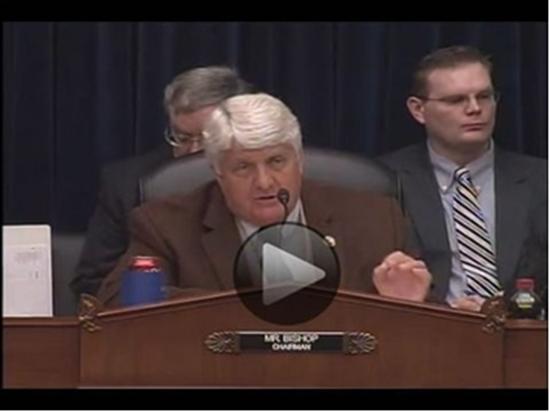Press Release
Witnesses Stress Need for Increased Border Security, Improved Access on Federal Lands
WASHINGTON, D.C.,
April 15, 2011
|
Jill Strait, Spencer Pederson or Crystal Feldman
(202-225-2761)
Today, the Subcommittee on National Parks, Forests and Public Lands and the Security, Homeland Defense, and Foreign Operations Subcommittee held a joint oversight hearing on the impacts of environmental laws and federal regulations on border security and the environment. Members heard from former Border Patrol Officers and affected citizens who discussed how these regulations are impeding U.S. Border Patrol’s ability to do their job – leaving our federal lands open to criminals, drug smugglers and human traffickers who cause significant environmental damage.
“It is exceptionally clear after hearing today’s testimony that significant limitations continue to be placed on the U.S. Border Patrol’s access to some of the most highly trafficked areas along the border. Environmental policies cannot take precedent over the safety and security of all Americans and that is exactly what is occurring today. In order for the Border Patrol to be as effective as possible in deterring and apprehending criminals they need to have routine access to our federal lands. The reality is that many parts of the U.S. along the southern border region are too dangerous for Americans to enter because they are overrun with drug traffickers and human smugglers. This is unacceptable and I plan to ensure that law enforcement is no longer hindered from doing their jobs to keep Americans safe,” said Subcommittee on National Parks, Forests and Public Lands Chairman Rob Bishop (R-UT). Earlier this week, Subcommittee Chairman Bishop introduced H.R. 1505, the National Security and Federal Lands Protection Act, to prohibit the Department of the Interior (DOI) and the United States Department of Agriculture (USDA) from using environmental regulations to hinder U.S. Border Patrol from securing our border on federal lands ensuring Border Patrol has operational control of our borders. At the hearing, Gene Wood, a Founding Member of the National Association of Former Border Patrol Officers (NAFBPO), recommended the implementation of H.R. 1505 to “achieve the goal of operational control.” He stated, “the difficulties encountered by the Border Patrol to gain operational control are not the result of poor management or lack of resources. It is simply an issue of denied access. … The time proven and effective techniques gained through years of experience are severely limited, or at times completely eliminated because of these self-imposed restrictions. Expensive technologies cannot be efficiently implemented, and manpower assets become more difficult to utilize successfully. It is for these reasons that the leadership of the National Association of Former Border Patrol Officers enthusiastically endorses the decisive remedies proposed by Congressman Bishop.” Click here to read Gene Wood’s full testimony. ### |
Newsletter Sign Up
Sign up to receive news, updates and insights directly to your inbox.

